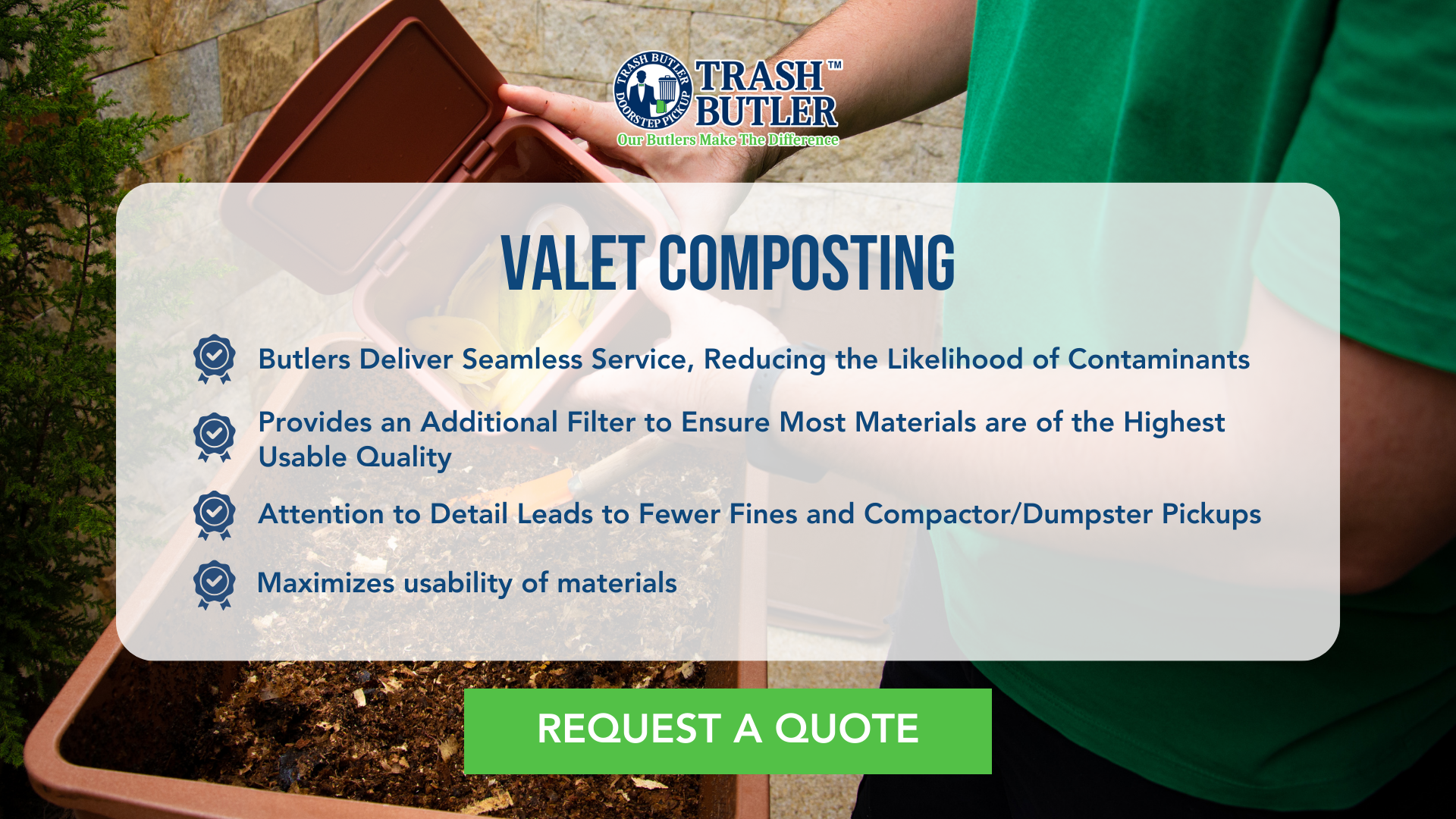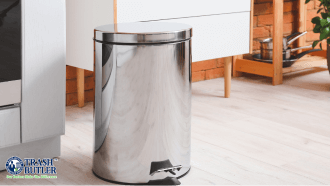In San Francisco, multi-family communities are increasingly embracing composting as a way to handle organic waste more sustainably, aligning with the city’s environmental goals. Trash Butler™, a leading doorstep valet trash service, specializes in catering to these communities, servicing over 275,000 units across the country, including San Francisco, to improve residents’ lives and positively impact the environment. This approach to waste management not only helps reduce the amount of waste sent to landfills but also supports soil health and overall sustainability.
Composting in multi-family communities, such as apartment complexes in San Francisco, comes with its own set of challenges that differ from single-family homes. Here are some of the key hurdles that property managers and residents may face when trying to implement composting programs in these settings:

One major challenge in multi-family communities is the limited space available for composting bins or piles. With residents living in close proximity to each other, finding suitable areas for composting can be difficult. Property managers must get creative in determining where compost bins can be placed without causing inconvenience or odors for residents.
Educating residents about the benefits of composting and how to properly separate organic waste from trash and recycling is crucial for the success of a composting program. In multi-family communities, ensuring high participation rates can be a challenge, as not all residents may be aware of or motivated to compost. Property managers may need to implement educational initiatives and incentivize composting to encourage active participation.
Effective management of odors and pest control is vital in multi-family composting efforts. Improperly maintained compost bins can attract unwanted pests like rodents or insects, leading to complaints from residents. Property managers must establish clear guidelines for maintaining and monitoring compost bins to prevent odor issues and keep pests at bay.
Logistics play a significant role in the success of composting programs in multi-family communities. Coordinating collection schedules, ensuring proper transport of organic waste to composting facilities, and managing the overall process require careful planning and efficient execution. Property managers may need to work closely with waste management providers to streamline compost collection processes and address any logistical challenges that may arise.
San Francisco leads in sustainable waste management by enforcing strict composting regulations for all, including multi-family communities. These rules mandate that residential buildings with five or more units must implement a composting program, separating food scraps, food-soiled paper, and yard waste to meet the city’s goals of reducing landfill waste and combating climate change.
Non-compliance can lead to fines, underlining the importance of correct waste sorting. Property managers are key in educating residents and ensuring the availability of compost bins and clear instructions. Trash Butler™ offers a doorstep valet trash service that includes compost collection, making it easier for apartment communities to comply with these regulations and contribute to a greener San Francisco. This partnership helps streamline composting efforts, supports legal compliance, and promotes environmental sustainability.
Composting in urban environments, especially in a city like San Francisco, offers a host of benefits that contribute to a more sustainable and eco-friendly community. Here are some key advantages of composting for multi-family apartment communities in urban settings:
Composting diverts organic material from ending up in landfills, where it would release harmful greenhouse gases as it decomposes. By composting, residents and property managers can significantly reduce the volume of waste that goes to landfills, helping to mitigate environmental pollution and preserve valuable landfill space.
Composting creates nutrient-rich soil that can be used to enrich landscaping, gardens, and green spaces within the apartment community. This organic soil acts as a natural fertilizer, promoting healthy plant growth and reducing the need for chemical fertilizers, thus contributing to a more sustainable and greener environment.
Implementing a composting program fosters a sense of community within multi-family apartment complexes. Residents can work together to collect organic waste, maintain compost bins, and educate each other on the benefits of composting. This shared experience not only promotes environmental stewardship but also strengthens the bond among residents, creating a more cohesive living environment.
Composting aligns with the overall sustainability goals of urban communities like San Francisco. By incorporating composting into daily waste management practices, residents and property managers demonstrate a commitment to reducing their environmental footprint and promoting sustainable living practices. This environmentally conscious approach can help attract eco-conscious residents and enhance the overall reputation of the apartment complex.
In San Francisco, multi-family communities often find it challenging to find space for composting, but with creative solutions, these challenges can be tackled effectively. Vertical composting systems make excellent use of upward space by stacking bins, conserving valuable ground area while supporting composting activities. Indoor options like vermicomposting, which relies on worms to decompose organic waste, offer an efficient, smell-free method for buildings with little to no outdoor space.
Teaming up with local composting facilities or community gardens can provide an alternative by allowing for the off-site composting of materials, removing the need for on-site space altogether. Also, organizing a composting schedule or shared composting stations can maximize the available space and encourage community participation. With these innovative approaches, apartment complexes can navigate the issue of limited space and contribute to a sustainable environment.

Introducing a composting program in San Francisco’s multi-family communities offers environmental benefits and enhances residents’ quality of life, making it a smart move for property managers and residents alike. With Trash Butler™, adopting sustainable practices like composting becomes effortless, streamlining the process of collecting and disposing of organic waste.
This not only contributes to landfill waste reduction and lower greenhouse gas emissions but also creates nutrient-rich soil ideal for gardening, boosting both property appeal and environmental health.
By choosing Trash Butler,, multi-family communities in San Francisco can take significant steps towards a sustainable future, emphasizing convenience, eco-friendliness, and community improvement.
San Francisco is considered one of the most ecological cities in the USA due to its innovative waste management programs, focus on sustainability, and commitment to environmental initiatives.
Garbage in San Francisco is sent to the landfill, recycling materials are processed at recycling facilities, and organic waste is composted.
San Francisco has been working towards sustainability for many years, with the city implementing various environmental initiatives and programs to reduce waste and promote eco-friendly practices.
San Francisco aims to achieve zero waste by diverting all materials from the landfill through recycling, composting, and other waste reduction strategies.
San Francisco produces around X amount of waste per capita, with efforts in place to reduce this through composting and recycling programs.
The city of San Francisco offers support to multi-family communities by providing resources, educational materials, and access to composting programs to encourage sustainable waste management practices.
New multi-family communities in San Francisco can integrate composting from the start by working with waste management companies, setting up designated composting areas, and educating residents on the importance of composting.
Yes, there have been several success stories of multi-family communities in San Francisco effectively implementing composting programs and significantly reducing their waste output.
Composting plays a crucial role in San Francisco’s waste management strategy by diverting organic materials from landfills, reducing greenhouse gas emissions, and supporting the city’s goal of achieving zero waste.

Why Valet Trash Services Are Essential For Orlando Apartments
Discover why valet trash for apartments in Orlando is essential. Enhance resident satisfaction and property value with top-notch valet trash…

Why Valet Trash Services Are Essential For Orlando Apartments
Discover why valet trash for apartments in Orlando is essential. Enhance resident satisfaction and property value with top-notch valet trash…

Everything Property Managers Need To Know About Doorstep Trash Pickup
Essential guide for property managers on doorstep trash pickup for apartments. Improve tenant satisfaction and streamline operations with…